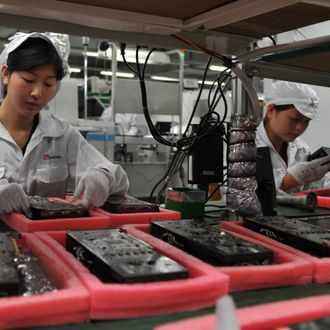
Workers at Foxconn Technology, a massive Chinese electronics manufacturing plant where, among other things, iPhones and iPads are produced, will get substantial pay raises following increased international outcry over the poor factory conditions there. Foxconn has famously been the site of a number of suicides — to the point where employees credibly threatened mass suicide as a negotiating tactic — and over the past six months or so, the American press has particularly turned its scrutiny to Apple’s involvement with Foxconn. (A much-discussed “This American Life” episode and a New York Times investigation are good places to start, if you’re new to the Foxconn controversy.)
The raise is between 16 and 25 percent per worker, which would bring monthly salaries up to about $400 per month. It’s also accompanied by a pledge to reduce overtime, and that part of the deal goes a lot further in addressing the actual concerns of Foxconn critics. (Punishing amounts of overtime were said to be a factor in the suicides.) But the overtime promise is also harder to fact-check and moderate for outsiders; and the toxic chemicals and dangerous working conditions that critics have also pointed to aren’t addressed in the deal.
Still, as the Times points out, increased pay for workers at a huge industry leader like Foxconn means American companies are going to have to get used to paying a little more for their Chinese labor — and that could help nudge the system farther along toward meaningful change, though there’d have to be give from the consumer side, too.
“This is the way capitalism is supposed to work,” said David Autor, an economist at the Massachusetts Institute of Technology. “As nations develop, wages rise and life theoretically gets better for everyone.
“But in China, for that change to be permanent, consumers have to be willing to bear the consequences. When people read about bad Chinese factories in the paper, they might have a moment of outrage. But then they go to Amazon and are as ruthless as ever about paying the lowest prices.”
There are also demographic shifts putting pressure on Foxconn: There are fewer young people in China, and they’re less willing to stay in terrible factory jobs. And so, leapfrogging ahead in the pace of industrialization, Foxconn is looking into using robots and automating more of its production as a way to keep production costs low and output high.





























